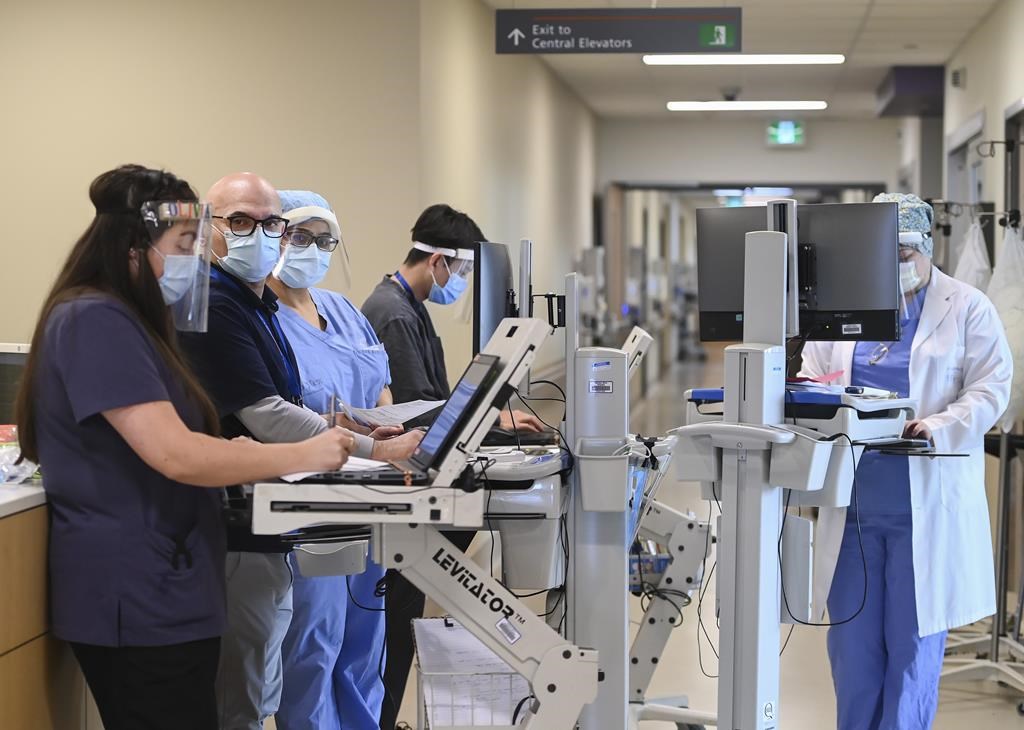TORONTO — The scientific director of Ontario’s COVID-19 advisory group and the Ontario Hospital Association say provincial mask mandates for hospitals should have been extended beyond their weekend expiry date, but the province’s top doctor says it’s time to replace the rules with guidance.
Dr. Kieran Moore, Ontario’s chief medical officer of health, announced this week that mask mandates on public transit and in most health settings will lift as scheduled on Saturday.
The emergency orders were always supposed to be time-limited and repealed once the major threat of the virus decreased, Moore said Thursday, and with indicators such as hospitalizations and test positivity rates declining, that time is now.
“We’re finally, two and a half years later, at a point where we can remove these emergency directives that have been put in play,” Moore said in an interview.
“They’re very heavy-handed in that they include fines and actually the possibility of going to jail for not adhering to them.”
Moore said he was not aware of any fines being levied for mask non-compliance in hospitals.
The provincial guidance that will replace the directives will advise continuing masking for hospital patients, visitors and staff, Moore said.
“The only thing that’s changing at 12 midnight on the 11th of June is the mandatory nature of the directives,” he said.
“We now have two-and-a-half years of experience of how to deal with this virus in the health-care sectors. We have best practices, guidelines, risk assessment tools that we’ve shared with all of our hospital partners and quite frankly our hospitals are leaders in the world on infection prevention and control practices.”
Dr. Fahad Razak, the scientific director of Ontario’s COVID-19 science advisory table, said Thursday that the health-care system is still showing “signs of real strain,” which an extended mask mandate could have helped with.
“Many individuals in the health-care community, including myself, think that probably the mandates could have been kept in place longer,” Razak said in an interview.
“It’s not just about the numbers of patients coming in, it’s this burn out, it’s the health-care worker shortages and just (needing) more time for us to get through this.”
While extending the mandates a bit longer would give the health-care system some breathing room, Razak said it’s ultimately a judgment call and reasonable people will disagree on the timing.
“At the end of the day there is no scientific way to say, ‘Today is the day where the mask mandates are lifted, but yesterday it wasn’t safe to do so,'” Razak said. “That clean transition doesn’t happen.”
Mask mandates will remain, however, in long-term care and retirement homes, because of the vulnerable populations there who are at high risk of severe outcomes from COVID-19.
The length of the mandate in long-term care will be up to the minister in charge of that file, Moore said, but his recommendation would be to keep it in place until at least the summer of 2023.
“We know that this fall we’ll have a return of the normal respiratory viruses, that influenza is going to want to come back, because we’re seeing that in Australia as we speak as they head into their winter,” he said.
“We’re anticipating we will need that protection for that long-term care sector throughout this summer and through what could be a difficult winter. So if I was to advise the new minister, that would be my advice going forward.”
Many Ontario hospitals across the province said they would be keeping mask rules in place for visitors and staff, pointing to similar risk factors among their patients.
The president of the Ontario Hospital Association said the organization representing the province’s public hospitals had recommended an extension to the provincial order requiring masking in hospital settings.
Anthony Dale said it would have been appropriate to keep the rule because vulnerable people are at heightened risk of infection even if overall COVID-19 hospitalizations are declining.
“A provincial order carries the force of law behind it and directly supports hospitals as they enforce compliance,” Dale said in a written statement, adding that he expects hospitals will maintain their own policies around masks.
The Children’s Hospital of Eastern Ontario issued a statement on its continued policy that noted, like the Hospital for Sick Children in Toronto, that its vulnerable patients under the age of five aren’t eligible for COVID-19 vaccination yet.
“We are maintaining our status quo because it’s prudent. And, frankly, we have no other responsible choice,” the statement said, adding that the Ottawa hospital is busy with injuries and high instances of viral infections and staffing challenges related to COVID-19.
“Kids have taken the brunt of this pandemic. Our staff and medical staff have stepped up to buffer the impacts where they can, and in maintaining the status quo on screening and masking, we’re doing so again,” the statement said.
On a stretch of University Avenue in Toronto nicknamed “hospital row” by some for its heavy concentration of hospitals, workers said they also preferred keeping masks in their workplaces, which most had decided to do already.
“I’m a health-care worker, so obviously I’m all for it,” one woman in scrubs remarked on a break outside Toronto General Hospital.
Toronto resident Dorothy Chapolega said outside the hospital that she will keep wearing a mask due to chronic health conditions that put her at high risk of a COVID-19 infection.
She said she feels safer when those around her wear masks, and she would like the mask mandates stay in place to protect people who could die from the disease.
“I don’t think it’s right,” she said. “I feel we should continue wearing masks.”
This report by The Canadian Press was first published June 9, 2022.



